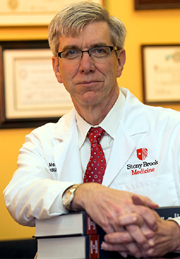By Mark A. Talamini, MD, MBA, Chairman of Surgery, Stony Brook Medicine
The American Board of Surgery sent out a very important email recently, announcing "a new direction for our program of lifelong learning and continuous certification."
The most potent piece of information in this email related to the written examination that all holders of an American Board of Surgery certificate have had to take every ten years since 1976.
The email details that "diplomates [board-certified surgeons] will be offered alternatives to the ten-year recertification examination in general surgery," with those alternatives not yet determined.
This news came right home for me, as I was about to figure out how I would block out study time for the exam later this year.
All of us who have periodically taken this exam know the drill. Drop everything for a few weeks and memorize testable details regarding the broad field of general surgery. Then go to a testing center, empty your pockets into a small locker, and take a tough multi-hour exam.
Surgery must have a means of communicating to the public that surgeons are
competent throughout their surgical careers, not just at the beginning of their careers.
Not requiring this exam is a massive change. What has brought it about?
There has been a recent physician backlash against the ever-increasing and ever-expensive requirements that doctors feel burdened by. The focus has been internal medicine. As a result, legislation has been introduced in numerous statehouses to make requirement of board recertification for hospital privileging illegal.
The drama is unwelcome. Surgery must have a means of communicating to the public that surgeons are competent throughout their surgical careers, not just at the beginning of their careers when they have just passed a series of rigorous examinations.
But the model of a multiple choice test every ten years can definitely be improved upon.
So how should the public read this? To some degree, it is an important work force (surgeons and physicians) making clear the increasing regulatory, administrative, and financial burdens of the current practice of medicine are taking a toll.
The patience of the American physician workforce is not limitless.
I believe the more important message is that the American Board of Surgery, with the support of the vast majority of surgeons, is committed to lifelong learning and assessment of skills. They will take the current bit of turmoil as an opportunity to create a much better means of doing so.
| The American Board of Surgery is an independent, nonprofit organization founded in 1937 to assess the qualifications of individuals in the field of surgery. It offers primary board certification in surgery (general surgery) and vascular surgery, and secondary certification in several related specialties. Not all surgeons are board certified. Board certification is a voluntary process that demonstrates a surgeon's commitment to professionalism, lifelong learning, and quality patient care. Approximately 30,000 surgeons are currently board certified by the American Board of Surgery. |
Read more about certification provided by the American Board of Surgery — why it matters and how it's obtained.

